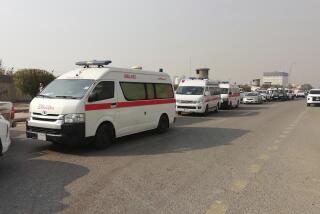Attacks Target More Iraqi Police
- Share via
KUFA, Iraq — The police chief in a city south of Baghdad was killed in a drive-by attack and another chief in a neighboring province was buried Saturday, the same day that supporters of a firebrand cleric expressed increasingly vocal anti-American sentiment.
The assassination Saturday morning of the police chief of Mahmoudiya, a city 20 miles south of Baghdad, came a few hours before the funeral of the chief of this southern town, who was gunned down Friday afternoon on his way home from the police station. More than 350 members of the Iraqi police have been killed in attacks during the last year.
An officer was also fatally shot by unknown assailants in Mahmoudiya on Saturday afternoon, Associated Press reported.
Mahmoudiya lies at the southern edge of the so-called Sunni Triangle, and attacks are commonplace there on Westerners and Iraqi police who are seen as collaborators of the U.S.-led occupation. Seven Spanish intelligence officers were killed near there last November. A missionary and two local staffers for CNN were killed in the area this year. There also have been many attacks on Iraqi police, including the assassination of the police chief of Latifiya, a neighboring town.
Another indication of the volatile situation came Saturday morning, as thousands of members of a militia loyal to Shiite Muslim cleric Muqtader Sadr marched through a section of Baghdad. The demonstration came after a newspaper published by Sadr’s organization was shut down by the U.S.-led coalition last week for allegedly publishing incendiary articles advocating resistance to the occupation.
Sadr, who is in his early 30s, draws much of his support from the legacy of his father, a revered cleric slain in 1999 by assassins believed linked to the former regime of Saddam Hussein.
Sadr has not agitated for direct violence against the occupying authorities, but his followers have been increasingly vocal. Thousands thronged outside the coalition headquarters in Baghdad on Friday. Sadr announced during prayers that day that he was allying himself with the Islamic militant groups Hezbollah and Hamas. Like Saturday’s marchers, those demonstrators were largely unarmed.
Shiites, who make up 60% of Iraq’s population, have generally refrained from violent resistance. Most attacks have come from areas populated by Sunni Muslims loyal to the former Hussein regime.
The heart of that resistance is the city of Fallouja, just west of Baghdad, where four American civilian contractors were killed and their remains mutilated Wednesday. American military officials have promised a tough response but have not said when it would occur. On Saturday afternoon, the city streets emptied and shopkeepers closed early in anticipation of retaliation.
Although they did not criticize the killing of the contractors, several Iraqis condemned the treatment of the Americans’ corpses as contrary to Islam.
“It was a tragic mistake committed by people who do not belong to this city,” said Abdullah Abood, 45, who owns a market in Fallouja.
In contrast to the eerie calm around Fallouja, the Shiite south was restless Saturday. Officials in Sadr’s organization, based in Kufa, said that coalition-led troops had detained one of their senior clerics, Mustafa Yaqoubi. But a spokesman for the Spanish military, which controls that area, insisted that there had been no detention.
Regardless, hundreds of demonstrators converged on the base of Spanish-led troops in Kufa, chanting, “No, no to America and Israel!” and demanding Yaqoubi’s release.
*
Special correspondents Hamid Sulaibi in Fallouja and Saad Fakhrildeen in Najaf contributed to this report.
--- UNPUBLISHED NOTE ---
In stories after April 9, 2004, Shiite cleric Muqtader Sadr is correctly referred to as Muqtada Sadr.
--- END NOTE ---
More to Read
Sign up for Essential California
The most important California stories and recommendations in your inbox every morning.
You may occasionally receive promotional content from the Los Angeles Times.












